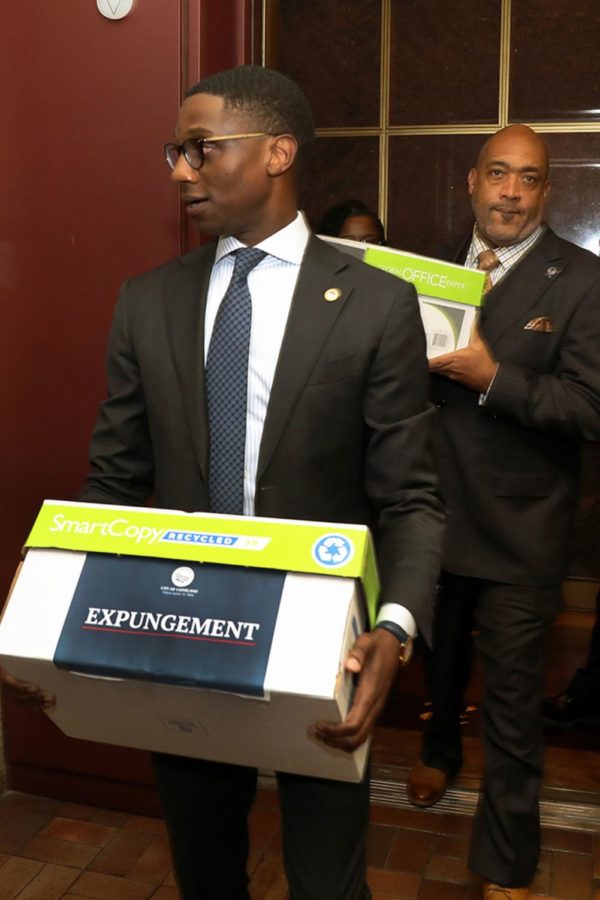Cleveland plans to expunge marijuana convictions en masse
Courtesy of Jake Zuckerman/Cleveland.com
Mayor Justin Bibb (left) and City Council President Blaine Griffin (right) carry court motions on April 6, 2022 in their first failed attempt to expunge marijuana convictions and charges.
January 20, 2023
Cleveland may soon be making strides towards cannabis policy reform by expunging convictions related to misdemeanor marijuana cases.
Mayor Justin Bibb came into office promising to reform the city’s approach to criminal justice, primarily when it came to drug-related charges. While marijuana has been decriminalized in the city of Cleveland since 2020, with fines and jail time being eliminated for individuals carrying up to 200 grams of marijuana, thousands of Clevelanders remain who have been charged with marijuana-related crimes prior to 2020 and hundreds of those who were mistakenly charged by city prosecutors. Marijuana remains illegal in the state of Ohio except for medical usage so prosecutors are still able to technically supersede city law and charge individuals for marijuana usage, leading to the discrepancy. To honor the spirit of the city’s decriminalization, Bibb moved to expunge over 4,000 convictions for misdemeanor marijuana cases in April 2022, with the cases being affected dating back to 2017. However the mayor’s plan hit a snag as Ohio state law did not allow the city to file a motion clearing charges from the records of residents unilaterally, with individuals instead having to be the ones to initiate the expungement by filing their own motion. In the months since Bibb’s motion was blocked, the city has been trying to provide information to eligible residents to have their marijuana charges expunged or sealed via the Cleveland Municipal Court, but this remained a stop-gap solution.
Now, however, the city of Cleveland intends to try again following the passage of Ohio Senate Bill 288, which was signed into law by Ohio Gov. Mike DeWine on Jan. 3. An amendment to the bill now allows prosecutors to initiate the process of sealing or expungement of fourth-degree or minor misdemeanor drug charges rather than requiring defendants to do so. With the law going into effect in April, the city will be able to try again to process and expunge the convictions in question.
The amendment came about due to lobbying by the Bibb administration for changes to state law regarding drug charges. While the Ohio state legislature is controlled by Republican supermajorities and Bibb is a Democrat, Bibb was able to work with state legislators on this issue, even if other policy conflicts surrounding issues like gun control and taxation remain between the deeply Democratic city and the increasingly Republican state.
“I think Republicans recognize the economic consequences,” Bibb said. “If folks can’t get a job or start a business, it doesn’t make us a competitive state long-term.”
Once the city moves to expunge or seal the convictions, it may still take time to completely settle as defendants must consent to having their charges revoked and judges must still approve each expungement individually, allowing them to factor in other charges the defendant may have and the city government’s case to wipe away the convictions.
“We’re going to go through a very deliberative process to get this done right,” Bibb said.




